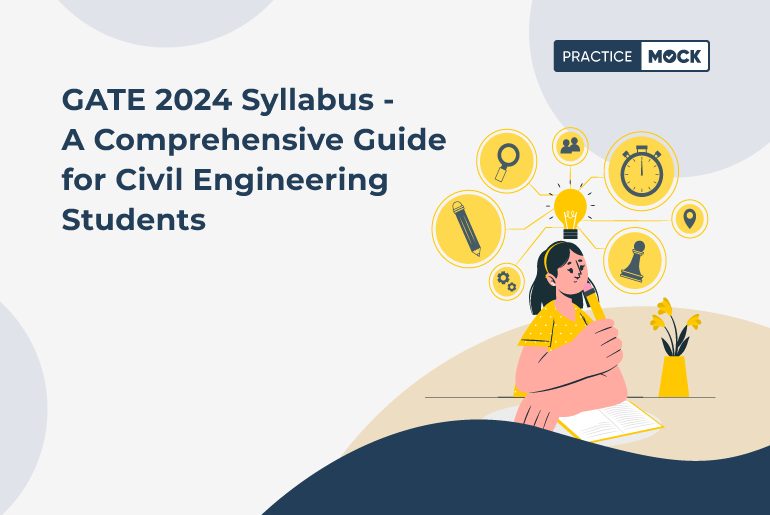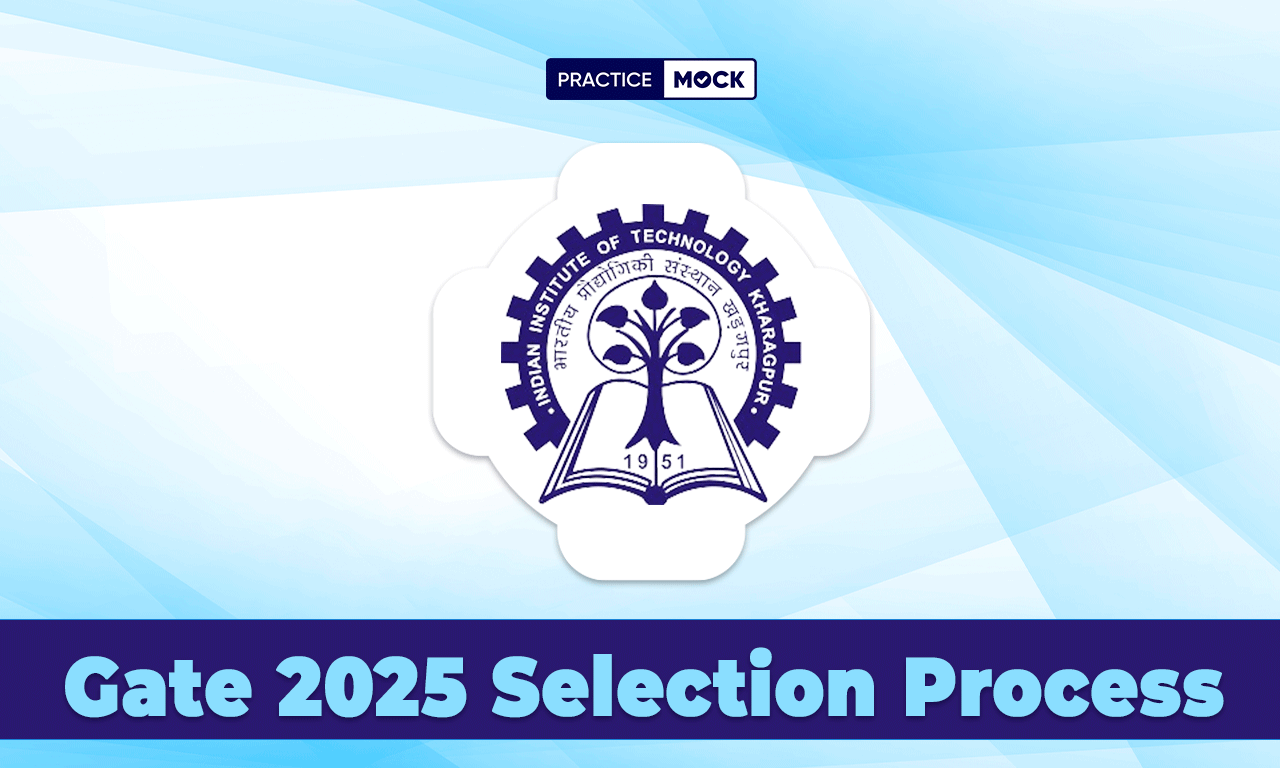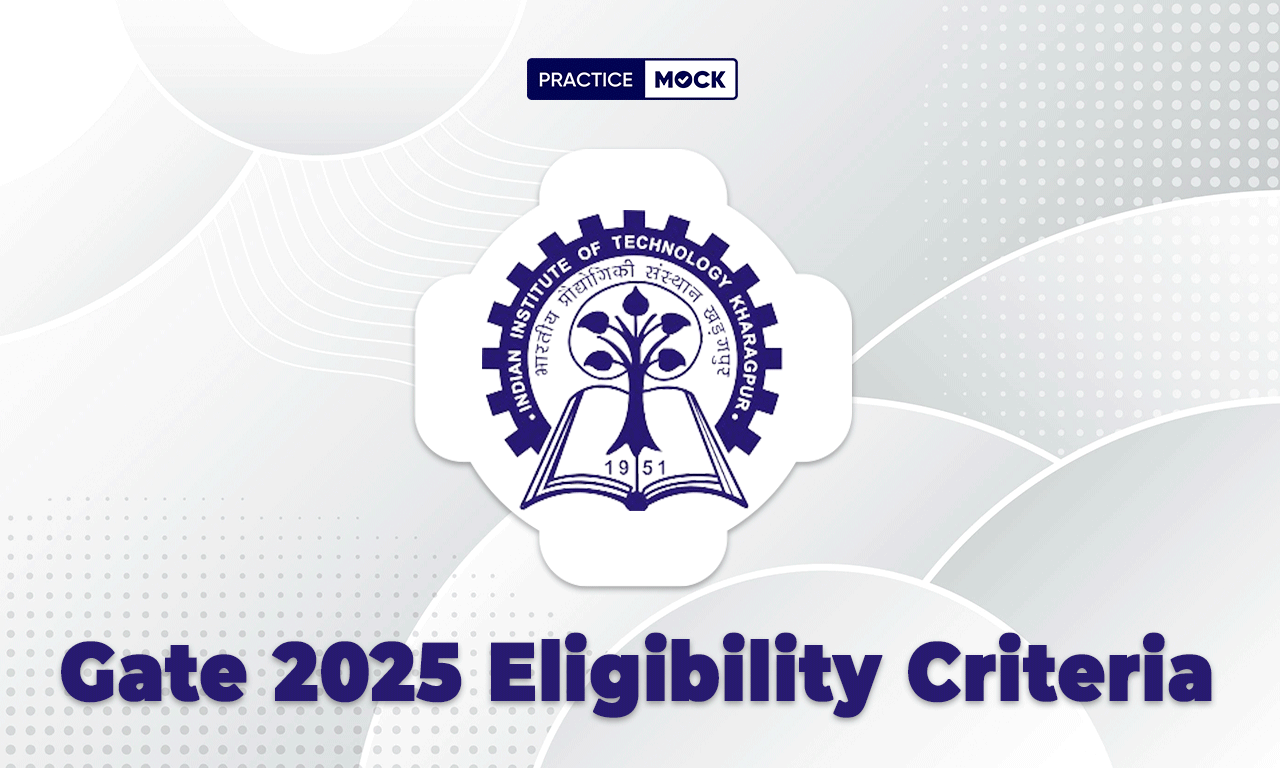GATE 2024 Syllabus – A Comprehensive Guide for Civil Engineering Students


Preparing for the Graduate Aptitude Test in Engineering (GATE) is a significant step for any aspiring engineer. GATE not only opens the door to postgraduate programs at prestigious institutions but also paves the way for various career opportunities in both the public and private sectors. For those specializing in Civil Engineering and Mechanical Engineering, a strong grasp of the GATE 2024 syllabus is essential.
In this blog, we will delve into the key highlights of the GATE syllabus for these disciplines, and also provide you with an exciting opportunity to take a free mock test at the end!
Also read: How to Clear GATE 2024 Exam On the Very First Attempt?
GATE Exam Pattern 2024 Civil Engineering
| GATE 2024 Exam Mode | Computer Based Test (Online) |
| GATE 2024 Exam Duration | 3 Hours |
| No. of Subjects | 30 Subjects |
| GATE 2024 Total Marks | 100 Marks |
| GATE Exam 2024 Number of Questions Asked | 10 (GA) + 55 (subject) = 65 Questions |
| GATE Exam 2024 Type of Questions | Multiple Choice Questions (MCQs), Multiple Select Questions (MSQs), and Numerical Answer Type Questions (NATs) |
Prime Your GATE Civil Engineering 2024 Readiness: 1-Week Mock Exam Drills for a Solid Beginning
| Day 1 | Get 1 Free GATE 2024 Mock Test |
| Day 2 | GATE 2024 Mock Test 2 |
| Day 3 | Get Subject Test |
| Day 4 | GATE 2024 Mock Test 3 |
| Day 5 | GATE 2024 Mock Test 4 |
| Day 6 | Get Topic Test |
| Day 7 | GATE 2024 Mock Test 5 |
GATE 2024 Syllabus – A Comprehensive Guide for Civil Engineering Students
Civil and Mechanical Engineering are two of the most sought-after branches in engineering, and the GATE syllabus for these disciplines is designed to assess your understanding of core concepts, problem-solving skills, and practical application.
Let’s take a quick look at what each syllabus encompasses:
Civil Engineering
The Civil Engineering syllabus for GATE 2024 covers a wide spectrum of topics. From structural engineering and geotechnical engineering to environmental engineering and transportation, the syllabus is designed to test your knowledge across various domains. This includes subjects like Structural Analysis, Concrete Structures, Steel Structures, Environmental Engineering, and more.
GATE Syllabus 2024 Civil Engineering
Section 1: Engineering Mathematics
Linear Algebra:
- Matrix algebra
- Systems of linear equations
- Eigen values and Eigen vectors
Calculus:
- Functions of single variable
- Limit, continuity and differentiability
- Mean value theorems
- Local maxima and minima
- Taylor series
- Evaluation of definite and indefinite integrals
- Application of definite integral to obtain area and volume
- Partial derivatives
- Vector identities
- Directional derivatives
- Total derivative
- Gradient
- Divergence and Curl
- Line, Surface and
- Volume integrals
Ordinary Differential Equation (ODE):
- First order (linear and non-linear) equations
- Initial and boundary value problems
- Higher order linear equations with constant coefficients
- Euler-Cauchy equations
Partial Differential Equation (PDE):
- Fourier series
- Separation of variables
- Two-dimensional Laplace equation
- Solutions of one-dimensional diffusion equation
- First and second-order one-dimensional wave equation and
Probability and Statistics:
- Sampling theorems
- Conditional probability
- Poisson and Normal Distribution
- Linear regression
- Descriptive statistics – Mean, median, mode and standard deviation
- Random Variables – Discrete and Continuous
Numerical Methods:
- Error analysis
- Numerical differentiation
- Integration by trapezoidal and
- Simpson’s rule
- Numerical solutions of linear and non-linear algebraic equations
- Newton’s and Lagrange polynomials
- Single and multi-step methods for first-order differential equations
Section 2: Structural Engineering
Engineering Mechanics:
- System of forces
- Free-body diagrams
- Equilibrium equations
- Centre of mass
- Internal forces in structures
- Frictions and its applications
- Free Vibrations of undamped SDOF system
Solid Mechanics:
- Simple bending theory
- Flexural and shear stresses
- Shear centre
- Uniform torsion
- Transformation of stress
- Buckling of column
- Bending moment and shear force in statically determinate beams
- Simple stress and strain relationships
- Combined and direct bending stresses
Structural Analysis:
- Method of superposition
- Analysis of trusses
- Arches
- Beams
- Cables and frames
- Influence lines
- Statically determinate and indeterminate structures by force/ energy methods
- Displacement methods: Slope deflection and moment distribution methods
- Stiffness and flexibility methods of structural analysis
Construction Materials and Management:
- Construction Materials
- Structural Steel – Composition
- Material properties and behavior
- Concrete – Constituents
- Mix design
- Cost estimation
- Short-term and long-term properties
- Construction Management: Types of construction projects
- Project planning and network analysis – PERT and CPM
Concrete Structures:
- Design of beams
- Slabs, columns
- Bond and development length
- Prestressed concrete beams
- Working stress and Limit state design concepts
Steel Structures:
- Beams and beam-columns
- Column bases
- Connections – simple and eccentric
- Beam-column connections
- Plate girders and trusses
- Working stress and Limit state design concepts
- Design of tension and compression members
- Concept of plastic analysis -beams and frames
Section 3: Geotechnical Engineering
Soil Mechanics:
- Three-phase system and phase relationships
- Index properties
- Flow nets
- Uplift pressure
- Piping
- Capillarity
- Seepage force
- Principle of effective stress and
- Unified and Indian standard soil classification system
- Permeability – one dimensional flow
- Seepage through soils – two – dimensional flow
- Quicksand condition
- Compaction of soils
- One- dimensional consolidation
- Time rate of consolidation
- Shear Strength
- Mohr’s circle
- Effective and total shear strength parameters
- Stress-Strain characteristics of clays and sand
- Stress paths
Foundation Engineering:
- Sub-surface investigations – Drilling bore holes
- Sampling, plate load test
- Standard penetration and cone penetration tests
- Earth pressure theories – Rankine and Coulomb
- Stability of slopes – Finite and infinite slopes
- Bishop’s method
- Stress distribution in soils – Boussinesq’s theory
- Pressure bulbs
- Effect of water table
- Combined footing and raft foundation
- Contact pressure
- Pile load test
- Pile under lateral loading
- Pile group efficiency
- Negative skin friction
- Settlement analysis in sands and clays
- Deep foundations – dynamic and static formulae
- Axial load capacity of piles in sands and clays
- Shallow foundations – Terzaghi’s and Meyerhoff’s bearing capacity theories
Section 4: Water Resources Engineering
Fluid Mechanics:
- Properties of fluids
- Fluid statics
- Continuity
- Momentum
- Potential flow
- Laminar and turbulent flow
- Flow in pipes
- Pipe networks
- Energy equations and their applications
- Concept of boundary layer and its growth
- Concept of lift and drag
Hydraulics:
- Forces on immersed bodies
- Flow measurement in channels and pipes
- Specific energy
- Critical flow
- Hydraulic jump
- Uniform flow
- Dimensional analysis and hydraulic similitude
- Channel Hydraulics – Energy-depth relationships
- Gradually varied flow and water surface profiles
Hydrology:
- Hydrologic cycle
- Precipitation
- Evaporation
- Unit hydrographs
- Hydrograph analysis
- Reservoir capacity
- Flood estimation and routing
- Surface runoff models
- Ground water hydrology
- Steady state well hydraulics and aquifers
- Evapo-transpiration
- Watershed
- Infiltration
- Application of Darcy’s Law
Irrigation:
- Types of irrigation systems and methods
- Lined and unlined canals
- Crop water requirements – Duty
- Design of weirs on permeable foundation
- Cross drainage structures
- Delta, evapotranspiration
- Gravity Dams and Spillways
Section 5: Environmental Engineering
Water and Waste Water Quality and Treatment:
- Basics of water quality standards – Physical
- Chemical and biological parameters
- Water quality index
- Unit processes and operations
- Effluent discharge standards
- Sludge disposal
- Water requirement
- Water distribution system
- Drinking water treatment
- Sewerage system design
- Quantity of domestic wastewater
- Primary and secondary treatment
- Reuse of treated sewage for different applications
Air Pollution:
- Types of pollutants
- Their sources and impacts
- Air quality standards
- Air quality Index and limits
- Air pollution control
Municipal Solid Wastes:
- Characteristics
- Generation
- Collection and transportation of solid wastes
- Engineered systems for solid waste management (reuse/ recycle, energy recovery, treatment and disposal)
Section 6: Transportation Engineering
Transportation Infrastructure:
- Geometric design of highways – cross-sectional elements
- Sight distances
- Concept of airport runway length
- Calculations and corrections
- Horizontal and vertical alignments
- Geometric design of railway Track – Speed and Cant
- Taxiway and exit taxiway design
Highway Pavements:
- Highway materials – desirable properties and tests
- Design factors for flexible and rigid pavements
- Design of flexible and rigid pavement using IRC codes
- Desirable properties of bituminous paving mixes
Traffic Engineering:
- Traffic studies on flow and speed
- Peak hour factor
- Accident study
- Traffic signs
- Signal design by Webster’s method
- Statistical analysis of traffic data
- Microscopic and macroscopic parameters of traffic flow
- Fundamental relationships
- Types of intersections
- Highway capacity
Section 7: Geomatics Engineering
- Principles of surveying
- Errors and their adjustment
- Maps – scale, coordinate system;
- Total station
- Horizontal and vertical curves
- Distance and angle measurement – Levelling and trigonometric levelling
- Traversing and triangulation survey
- Photogrammetry and Remote Sensing – Scale, flying height
- Basics of remote sensing and GIS
Click Here to Get the Official GATE PDF for Civil Engineering Syllabus👈
Takeaway #1: Free Mock Test Opportunity!
Are you ready to gauge your preparedness for the GATE 2024 exam? We’re excited to offer you a chance to take a GATE 2024 FREE mock test that specifically aligns with the Civil and Mechanical Engineering syllabus. Putting your knowledge to the test will help you identify your strengths and areas that need further attention. Remember, practice makes perfect, and taking a mock test can significantly boost your confidence for the actual exam.
Strategies for Effective Preparation:
Preparing for GATE 2024 requires a well-structured plan and dedication. Here are some strategies to help you navigate the preparation process:
- Understand the Syllabus: Familiarize yourself with the detailed syllabus to ensure you cover all the relevant topics.
- Create a Study Schedule: Plan your study routine by allocating time to each subject according to its weightage in the exam.
- Resource Selection: Choose the right study materials, including textbooks, reference guides, and online resources, to aid your preparation.
- Practice Regularly: Solve previous year’s question papers and attempt practice quizzes to enhance your problem-solving skills.
- Revision is Key: Regularly review your notes and concepts to reinforce your understanding and memory retention.
Takeaway #2: Ready to Take the Next Step?
As you embark on your journey towards GATE 2024 success, keep in mind that consistent effort and a strategic approach will yield positive results. Remember that success is not just about memorizing facts but understanding concepts and their applications. Don’t miss the opportunity to take our FREE GATE mock test to assess your progress and become familiar with the exam’s format.
Conclusion
GATE 2024 is your chance to showcase your engineering knowledge and skills to the world. Whether you’re aspiring to pursue higher education or aiming for career advancement, a solid performance in GATE can make a significant difference. With the right preparation, dedication, and a clear understanding of the syllabus, you’re well on your way to achieving your goals. Take advantage of the resources available, including the FREE mock test, to refine your preparation strategy and boost your confidence on exam day. Good luck on your GATE 2024 journey!
Click Here👉to Take a FREE GATE 2024 Mock Test: The Ultimate Way to Boost Your Exam Performance!
FAQs
Q: Where can I check the GATE Syllabus 2024 Civil Engineering?
A: You can find the GATE Syllabus 2024 Civil Engineering in this article.
Q: How can I download the GATE Syllabus 2024 Civil Engineering PDF?
A: You can get your hands on the GATE Syllabus 2024 Civil Engineering PDF through the direct link which will be available very soon in the article. Bookmark this page and stay tuned for the latest PDF.
Q: How to cover the GATE 2024 Civil Engineering Syllabus?
A: To cover the whole syllabus for GATE 2024 Civil Engineering, you must prepare an effective study timetable and follow the best strategy.
Q: How many questions will be there in the GATE 2024 Exam?
A: The GATE 2024 Exam will have a total of 65 questions.
Q: How many sections will be asked in the GATE 2024 Civil Engineering Paper?
A: The GATE 2024 Civil Engineering Paper will comprise three sections including General Aptitude, Engineering Mathematics, and a Specific Branch section.
Q: Where do I find the topic-wise GATE 2024 Civil Syllabus?
A: You can find the topic-wise GATE 2024 Civil Syllabus in this article.
Q: Are there any changes in the GATE Civil Engineering Syllabus?
A: Generally, the syllabus for GATE Civil Engineering doesn’t change. Candidates must stay tuned to this article for the latest updates.
Recent Posts
IBPS RRB Notification 2025, PO & Clerk Exam Date Out, Check All Upcoming Events
The IBPS RRB Notification 2025 is expected to be released in June 2025. candidates can…
How to do Fast Calculations with Vedic Maths for RRB PO 2025 Exam
In this article we are providing the preparation Strategy to do Fast Calculations with Vedic…
Top 5 Puzzles to Practice for RRB PO 2025 Exam, Check Strategies to Solve Question
Here we are providing the Top 5 Puzzles to Practice for the RRB PO 2025…
Most Asked Compound Interest Questions for RRB Clerk 2025 Exam
In this article we have shared the most asked compound interest questions for the RRB…
SSC CGL Question Paper Free PDF Based On Previous Year
This blog has provided the SSC CGL Question Paper Free PDF Based On Previous Year.…
How to Choose the Right Course for RBI Grade B Exam Preparation
Confused about RBI Grade B prep courses? Discover 5 smart tips to choose the best…


